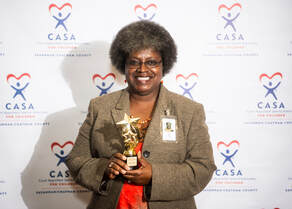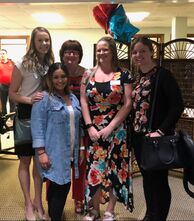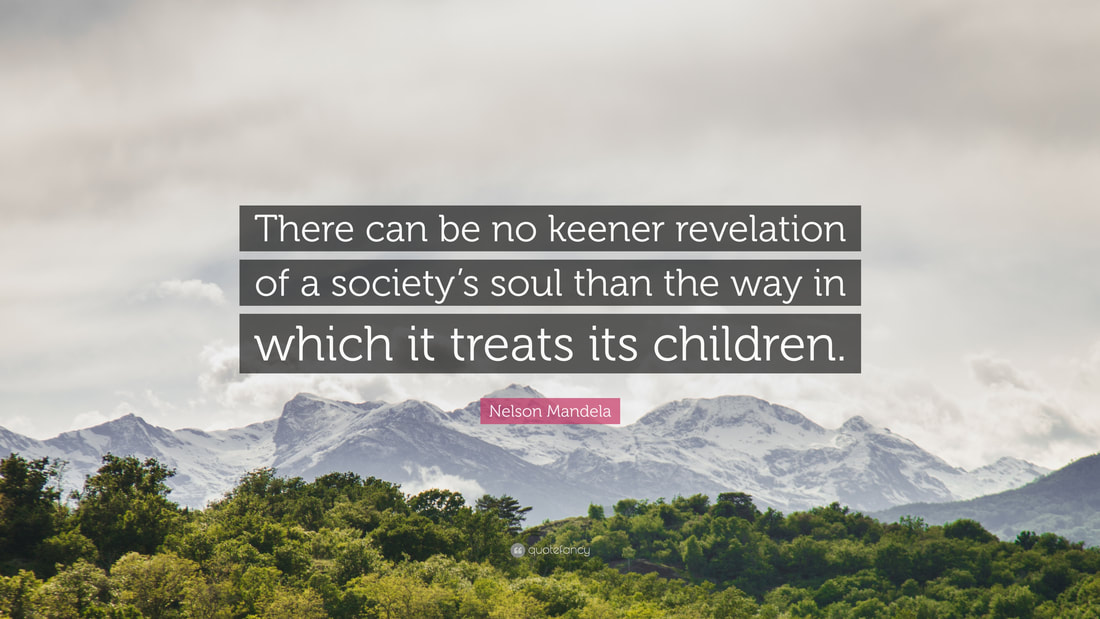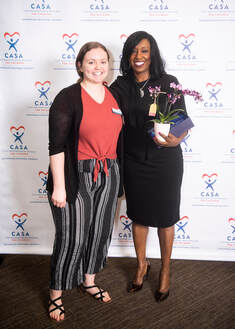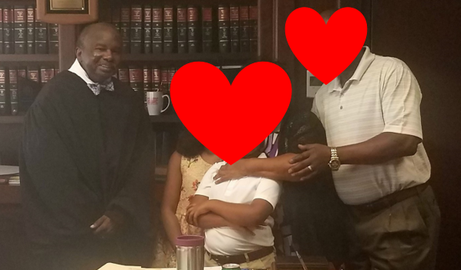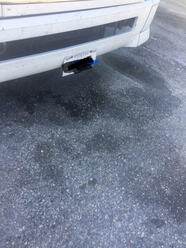You'll forever be my casaI began working as an Advocacy Coordinator for Savannah CASA in August 2020. As a newbie, I received current cases from my colleagues that would help me learn about many aspects of my new role. One of those cases was a 17-year-old young lady on the cusp of aging out of foster care named Jasmine*. To learn more about the case, I met with Jasmine’s Court Appointed Special Advocate (CASA), Saundra Poole, a deeply dedicated volunteer of nearly 4 years. Saundra provided me with important case-related information documenting Jasmine’s time in foster care which began when she was fourteen years old. I listened in awe as Saundra discussed this young lady’s journey with such passion and detail. It was as if she’d known her all of her life - her likes, dislikes, areas of emotional vulnerability, and her hopes for the future. During our conversation, I saw firsthand Saundra’s dedication and professionalism. As a past Savannah CASA intern and in my work as a Mental Health Counselor for 5 years, I had a basic understanding of the role of a CASA, but never before did I fully understand the extraordinary support that a CASA can provide in the life of a vulnerable child. At 17 years old, Jasmine was at an important junction to begin the transition into the adult world and Saundra was there at hand helping to guide her along this uncertain path. That day, I came to understand the true impact of a CASA volunteer.
More Instability - Except for CASA. Over the course of the next four months, Jasmine moved between the homes of four family members. My heart ached because Jasmine was once again experiencing an unstable living situation. But there remained one very bright light in Jasmine’s life - the durability and consistency of her relationship with her committed CASA volunteer, Saundra. Despite Jasmine’s case being closed in the court system, her relationship with Saundra continues today. Jasmine turns to Saundra whenever she is in distress. She reaches out whenever she needs advice on how to maneuver life’s challenges. Over the course of three years, Jasmine and Saundra built a strong and caring relationship. Saundra stood out in Jasmine’s life as a reliable voice of support. For Jasmine, Saundra was no longer her foster care advocate, she is her beloved Godmother. *name changed due to confidentiality About the author - Ja'Nae Brown
0 Comments
a casa changes a child's story
The children’s parents lived separately in two different states and each had their own court-ordered case plans to regain custody. To the father’s credit, he progressed towards the compliance of his goals more rapidly and eventually regained custody of the oldest child, with conditions. This court plan gave the father an opportunity to demonstrate his ability to care for one child before entrusting the other two siblings to his care. Pam provided guidance and encouragement to the father to accomplish his goals. Despite that in 2020 Pam’s work was constrained by the COVID pandemic, she persisted by continuing socially-distanced, in-person visits to assure the father was taking good care of his eldest child. Unfortunately, then came red flags. Pam was on hand to notice the lapses, prompting her and the case manager to address these significant concerns. Though reunification is always the ultimate goal, in this case Pam documented and reported that the father’s situation was deteriorating. A CASA Volunteer Can Turn a Child’s Story Around During these long months, Pam had never given up on the mother to have her accomplish her case plan goals to be reunited with the children as well. The mother first demonstrated she was on the road to success by completing her substance use disorder treatment program. She met with her children regularly. She obtained stable housing and gainful employment. Pam made trips out of state to meet with the mother in order to document her improving circumstances, not letting preconceived opinions interfere with increasingly positive observations. Pam ensured that the courts and all parties had records and photographs to inform the court of the mother’s progress. Pam’s efforts prompted a turnaround in the children’s circumstance. At the next hearing, the Judge accepted Pam’s recommendation and returned custody of all three siblings to their mother. Dedication of Our CASA Volunteers To change a child’s story, we need strong CASA advocates who recognize and document when a child’s life circumstances alter. With eyes and ears on the ground, a CASA’s recommendations can adroitly shift to recognize an evolving situation. As Pam demonstrated so forcefully, CASAs play this crucial role, of speaking up – sometimes as a lone voice – to advocate for the child’s best interest. With this support, the children become stronger and persevere to overcome the trajectory of their initial story. Remember, a CASA is the voice for the child. We integrate ourselves into a child’s case, chronicle the minute details of their lives and stand up to be heard. In Pam’s case, the three children eventually were reunified with their mother and today they are thriving and happy. Pam stays in touch, further strengthening the bond that formed over time. Even though 2020 presented barriers unlike any we could have imagined, Pam found creative ways to help the three siblings settle into their permanent home. Our CASAs work tirelessly to support over 375 children who live in foster care. Today, Pam is again displaying her dedication to help another child find a permanent home - this time with her grandparents. Again, we rejoice, she’s almost there! ABOUT THE AUTHOR - SHARON NEWMAN
FIGHTING FOR TANYA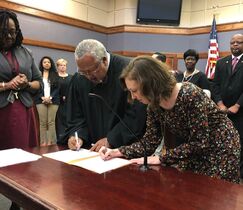 Amy Potter signing her oath to become a CASA volunteer with Judge LeRoy Burke. Amy Potter signing her oath to become a CASA volunteer with Judge LeRoy Burke. Painstaking Steps to Support Every Child. Earlier this year, a committed CASA volunteer, Amy Potter, came to me with concerns of neglect in a foster home. Naturally, we sprang into action. Of course, “springing into action" looks different in our minds than in reality, especially in the bureaucratic world of child welfare. Setting up the support systems to help a child newly entering foster care requires a series of small, thoughtful, and calculated steps. It requires great consideration given to the many moving parts while always keeping the child in the center of our decisions. This process leaves you wanting to scream “how isn't anyone else going crazy over this??!!" We are. Much of the work that takes place behind the scene to help a child hinges on patience - waiting for calls backs, locating open homes, and lots of paperwork. After countless contacts, written reports, and investigations coupled with sleepless nights and a few tears, a child is finally housed somewhere safe. And yet there are still no guarantees of success. At CASA, we can only hope that our efforts facilitate a placement that gives the child a safe and healthy foster home. Our CASA volunteers help to promote success by speaking with the family who is expecting the child into their home. They talk about the challenges that may arise, join in with excitement and nervousness and, above all, share mutual hope for the child’s wellbeing. Tanya’s Unsettled Journey. “Tanya” had been living in a neglectful foster home for over a year and she needed a more loving and supportive placement. Amy and I were discouraged by others who work in this complex system because they felt the battle to remove her would be too difficult. But we pressed on for Tanya’s sake. Despite all odds, we were successful in overcoming enough obstacles to have Tanya moved into a new home with first-time foster parents - brimming with optimism and love. Tanya was praised, given room to express herself and, importantly, given boundaries. Her grades improved and a closeness began to form with the family. Tanya was thriving. Still we, along with her foster family, were pleading for counseling services for this vulnerable child. Time went by and soon Tanya’s underlying trauma began to express. The foster family needed services to help her, but the support was insufficient. Each incident prompted us to urge the Department of Family and Child Services (DFCS) to intervene. But in a system strained by too much work for too few caseworkers, the help didn’t come fast enough. Tanya’s outbursts became physical and she endangered herself and others in the home. An altercation during the heat of a particularly bad episode spurred DFCS to move Tanya – again – into a new foster home after barely a month. What is Success for a Child in Foster Care. It is nearly impossible to know the outcome of a child’s story while still in the middle. We hope, pray, and work towards a stable, loving, and peaceful home where a child feels safe and the foster family can meet her or his needs. Tanya’s second foster family provided her with more stability in that brief month than she had known in her nine years but they were not provided with the tools to be successful. The child welfare system is overburdened and underfunded. It can be incredibly discouraging to do this work when you are faced with what appear to be unsurmountable obstacles. Our CASA volunteers are passionate and committed individuals who do not give up because they believe deeply that children in foster care deserve the very best. When Amy and I talked over Tanya’s wellbeing after the latest transition between foster homes, she was despondent, thinking she had failed Tanya in some way. She feared that removing her from the initial foster home, then into another and now, yet another caused further trauma. As Amy’s coordinator, I expressed the positive difference she made by fighting for Tanya and removing her from harmful circumstances. The difficult part of what we do as CASA staff and volunteers, is that we cannot predict a child’s future. With our most earnest efforts combined with experience, we make decisions with the information at hand and go from there. Tanya’s story didn't have the happy ending we had hoped for, or did it?
ABOUT THE AUTHOR - SUSAN RYNCAVAGE
The Taylor Siblings
The Urgency. This interaction brought on a new sense of urgency for Eula. She dove deeper into her advocacy, partnering with the case managers to gather documents, speaking with the various foster families to understand their intentions about adoption, and, all the while, continuing to develop relationships with the children so they knew they could count on her. While keeping siblings together in the same home is always a priority, sometimes, for a variety of reasons, it is in their best interests to be adopted separately. This was the case for the Taylor children which made everything that much more difficult. Eula and the key stakeholders needed to find three adoptive families that would prioritize the sibling bond while also addressing the high levels of trauma experienced by the children.
ABOUT THE AUTHOR - MAGGIE SMITHtapica's storyThe word came down from the caseworker that one of our children was on the run. A teenage girl, "Tapica", (name changed for privacy), had left her group home. The home has the well-deserved reputation where children in foster care can have a brighter future. But all that support wasn’t enough. The Fight for Survival. Tapica’s instincts for survival had kicked in with a fury. Tapica wanted to be with people she loved and living in a group home with 10 to 15 girls who had also experienced abuse or neglect felt as traumatizing as being in a disruptive home. Her Court Appointed Special Advocate (CASA), Maya Vereen, and I were working on solutions to get her closer to family, but the COVID pandemic delayed progress and the idle time weighed on her. There were nights we couldn’t sleep with worry.
Launching our new blog series “From the Heart,” each month one of our staff will offer insights on their experiences advocating for children experiencing foster care. OLIVIA's story Court Appointed Special Advocate (CASA) performs a crucial role in the life of a child in foster care. Their sole responsibility is to speak on behalf of the child – to grasp the complex and evolving details of a case and then advocate for the path of permanency in the child’s best interest. Each CASA volunteer spends long hours under difficult circumstances to understand strengths and weaknesses of those who comprise the web of people impacting the child. The CASA is part researcher, part social scientist who aims to perceive their own, and others’ biases that may cloud judgement influencing the welfare of the child. Here is Olivia’s story, illustrating these intersecting elements leading to a heart-warming outcome…
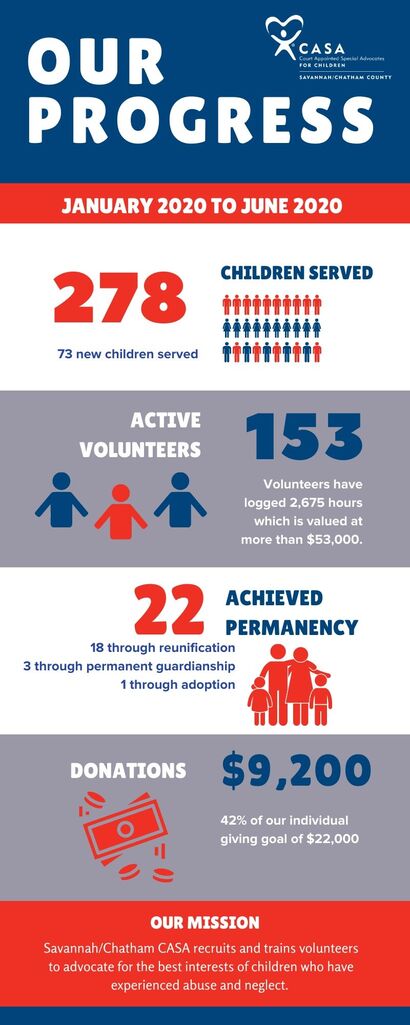 “2020 certainly had something in store for us, but it’s not quite what we imagined,” states Kate Blair, executive director. COVID-19 has altered how we conduct business, interact socially, travel, and much more. Although how we advocate for children who have experienced abuse and neglect has changed, it has not ceased. Fortunately, our staff, volunteers, and community partners have risen to the occasion to virtually advocate and continually fight for the best interests of children in foster care. As a result of these changes we have become masters at the art of zoom, held the first completely virtual volunteer training, and even polished up our Google suite knowledge to better support our volunteers and the mission of the organization. CASA volunteers- the real superheroes- have held countless phone calls, video chats, and conferences to their children, parents, foster caregivers, attorneys, and more to ensure the children’s needs are being met during this pandemic. So far volunteers have logged over 2,675 hours since January 2020, with a value of $53,000. Although many business operations have shifted or ceased, the work of Savannah/Chatham CASA has not. Our progress is attributed to dedicated community volunteers who serve as Court Appointed Special Advocates for our most vulnerable population, children who have experience abuse or neglect. Please take a look at our progress and see what else we’ve been up to:
To our fellow community members, please know that during this time of mourning, anger and frustration, erupting due to the deaths of George Floyd, Ahmaud Arbery, Breonna Taylor, and countless others, Savannah/Chatham CASA stands with our black staff, volunteers, families and children. We are deeply saddened by the continuation of violence against the black community and we demand justice for all who have experienced harm.
Speaking out against injustice aligns with the mission of CASA. We cannot properly advocate for our children if we do not understand the long history of structural and institutionalized racism that has resulted in a disproportionate number of black families within the child welfare system. In addition, research shows that black families experience higher rates of poverty, have less access to healthcare and mental health resources, and suffer from higher levels of generational and societal trauma. These cumulative hindrances impact the family unit, leading towards stress, abuse, and neglect. In Chatham County, 65% of those in foster care are black, despite only 47% of our population being black. We stand shoulder to shoulder with those who were able to show their solidarity at Sunday’s demonstration to demand better for our community. We are encouraged by Mayor Johnson’s initiative to create an equity taskforce. We at Savannah/Chatham CASA will follow his lead and ensure that we are addressing inequities in our sphere of influence as well. To do our part, our organization is committed to:
Our actions are long overdue. Savannah/Chatham CASA will not stop until EVERY child who has experienced abuse or neglect is given the opportunity to thrive in a safe and loving home. To see the full list of the CASA team who has signed this pledge, visit our page: Commitment to Racial Equity During these uncertain times, Savannah/Chatham CASA is taking every precaution to assist in flattening the curve of the Coronavirus. Our organization serves a population which consists of children, volunteers, and foster families who may be at risk due to age, health concerns, etc. For this reason, we have taken the following precautions until further notice:
Please remember that many of the families in our community will be hit hard by the impact of the Coronavirus. Things such as reduced work hours, lay-offs, increased medical expenses, lack of child care, and much more will make 2020 a very difficult year for many working hard to be reunified with their children. Please consider providing support to families in crisis by supporting organizations that are providing needed services such as soup kitchens, food pantries, child care providers, housing assistance providers, etc. Join the Be the Good- Savannah Facebook page to stay apprised of community needs. Please join with the Savannah/Chatham CASA staff and practice social distancing. This is not only encouraged for your well-being but for the well-being of those more vulnerable around you. Let's resist fear and promote love. We are in this together. Kate Blair, Executive Director .As the world faces the pandemic of COVID-19 many communities are exercising social distancing and find themselves isolated at home, away from peers, friends, work, school, and recreational activities. Here are a few suggestions from Savannah/Chatham CASA that encourage wellness and community connections while socially distant during the coronavirus crisis.
1.Become a CASA Sign up to learn more about becoming a CASA volunteer by visiting www.savannahcasa.org/learnmore. 2.Virtual Hangout Use Skype, Facetime, or Google Hangouts to video chat with friends and family while social distancing. 3.Spring Clean Use this time to declutter and tackle that organization project in your home. 4.Catch Up Now is the time to sit back and catch up on binge-worthy television shows and series. 5.Read On Pick out a good book and dedicate time to read it daily. Start a book club with a few of your friends and discuss your latest reads. 6.Snail Mail Send a letter to your pen pal the old school way- with pen, paper, and postage. 7.Get Moving Put on some music and get dancing! Find an activity that you enjoy and do it during the day. 8.Goal Set Evaluate your personal and professional goals and reset them if needed. 9.Try Something New That thing that you’ve always wanted to do- do it now. 10.Nothing. That’s right! Do absolutely nothing. Just be. |


